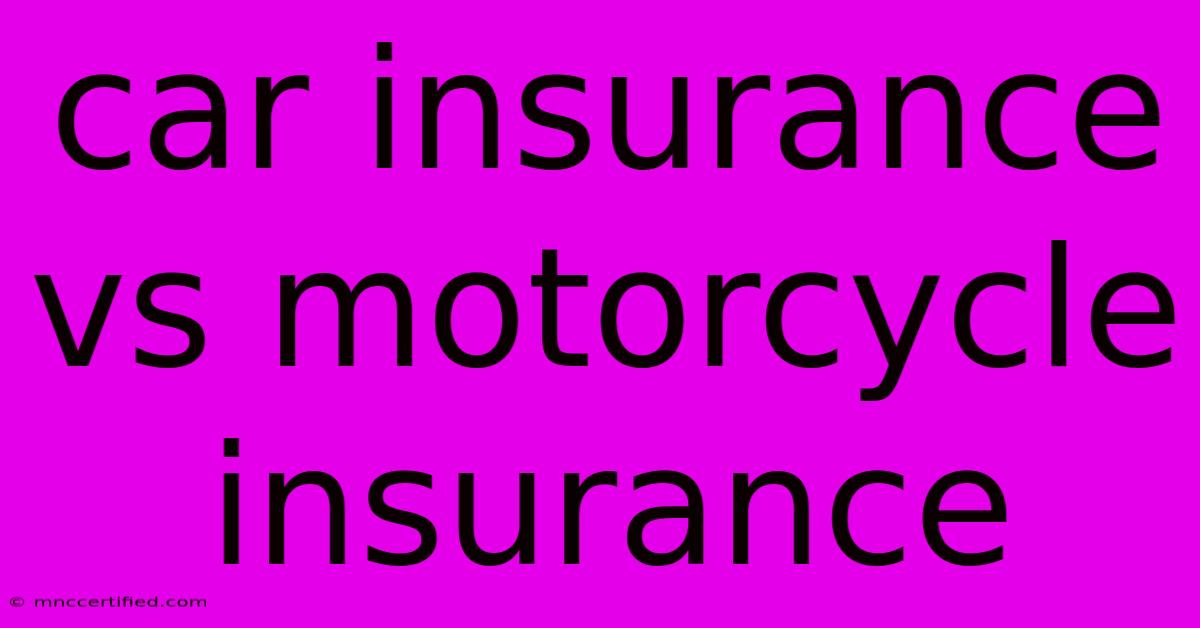Car Insurance Vs Motorcycle Insurance

Table of Contents
Car Insurance vs. Motorcycle Insurance: What's the Difference?
Owning a vehicle, whether it's a car or a motorcycle, comes with the responsibility of insuring it. But what are the key differences between car insurance and motorcycle insurance? Understanding these distinctions is crucial for making informed decisions about your coverage and ensuring you're adequately protected on the road.
Understanding the Basics
Both car insurance and motorcycle insurance aim to protect you financially in the event of an accident. However, the specific types of coverage and the factors influencing your premium differ significantly.
Key Differences:
1. Types of Coverage:
Car Insurance:
- Liability: Covers damages to other vehicles or property and injuries to other individuals in case you're at fault in an accident.
- Collision: Covers damages to your own car in an accident, regardless of who's at fault.
- Comprehensive: Covers damages to your car due to non-collision events like theft, vandalism, fire, or natural disasters.
- Uninsured/Underinsured Motorist: Protects you if you're hit by a driver without insurance or insufficient coverage.
- Personal Injury Protection (PIP): (In states that require it) Covers your medical expenses and lost wages after an accident, regardless of fault.
Motorcycle Insurance:
- Liability: Similar to car insurance, covering damages and injuries to others.
- Collision: Covers damages to your motorcycle in an accident.
- Comprehensive: Covers damages from events like theft, fire, or natural disasters.
- Uninsured/Underinsured Motorist: Same as car insurance.
- Optional Coverage:
- Medical Payments: Covers your medical expenses regardless of fault.
- Custom Equipment: Covers modifications and accessories beyond standard coverage.
- Roadside Assistance: Provides towing, jump starts, and other services.
2. Premium Factors:
Several factors influence your insurance premium for both car and motorcycle insurance, but some are unique to motorcycles:
Common Factors:
- Driving Record: Accidents, tickets, or DUI convictions increase premiums.
- Age and Experience: Younger drivers generally pay higher premiums.
- Vehicle Type and Value: More expensive or high-performance vehicles usually cost more to insure.
- Location: High-crime areas or densely populated cities may have higher rates.
Motorcycle-Specific Factors:
- Motorcycle Size and Type: Larger or more powerful motorcycles typically have higher premiums.
- Usage: Riding distance and frequency can influence your premium.
- Safety Equipment: Wearing a helmet and other safety gear can lower your rates in some states.
3. Coverage Limits:
Coverage limits, which determine the maximum amount your insurance will pay for a claim, can vary between car and motorcycle insurance. Motorcycle policies may have lower standard limits for collision and comprehensive coverage compared to car insurance.
4. Deductibles:
Deductibles, the amount you pay out-of-pocket before your insurance covers the remaining costs, can also differ. Motorcycle policies often have higher deductibles than car insurance policies.
Choosing the Right Coverage:
Choosing the right motorcycle insurance policy depends on your individual needs and riding habits. Consider factors like:
- Your budget: How much can you afford to pay for premiums?
- Your risk tolerance: Are you willing to pay a higher deductible for lower premiums?
- The value of your motorcycle: If you have a high-value motorcycle, you might need higher limits for collision and comprehensive coverage.
- Your riding habits: Do you ride frequently, in urban or rural areas, or primarily for leisure?
Remember:
- Consult with a reputable insurance agent to discuss your specific needs and obtain tailored quotes.
- Understand the terms and conditions of your policy carefully before signing.
- It's crucial to be aware of the differences between car and motorcycle insurance to ensure you have adequate protection for your specific situation.
By understanding the nuances of car insurance vs. motorcycle insurance, you can make informed decisions to secure the right coverage for your vehicle and peace of mind on the road.

Thank you for visiting our website wich cover about Car Insurance Vs Motorcycle Insurance. We hope the information provided has been useful to you. Feel free to contact us if you have any questions or need further assistance. See you next time and dont miss to bookmark.
Featured Posts
-
Best Tropical Real Estate Investments
Nov 10, 2024
-
Rock Ridge Insurance Why So Expensive
Nov 10, 2024
-
Liverpool Gets Salah Back Egypt Squad News
Nov 10, 2024
-
Cricket Nepal Takes On Thailand In U 19 Qualifiers
Nov 10, 2024
-
Tony Todds Film Career A Legacy
Nov 10, 2024